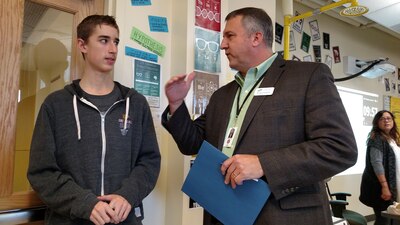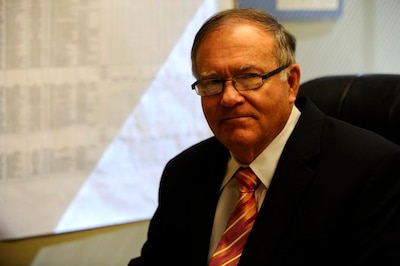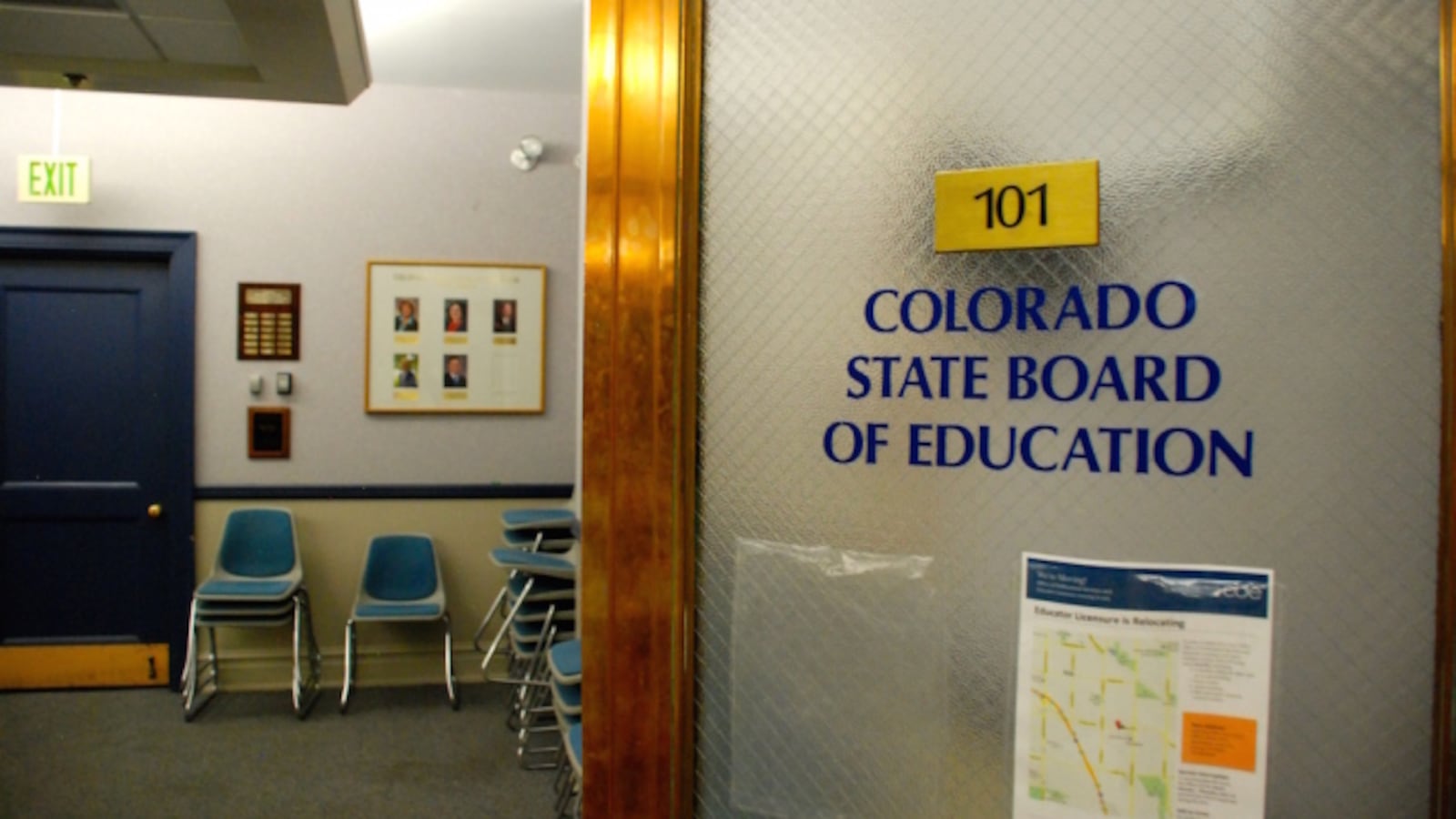On the first Wednesday in March, six of the seven members of the State Board of Education met for a private dinner with the man who was their unanimous pick for education commissioner.
Rich Crandall told them he needed direction. The former Arizona lawmaker and businessman, who briefly served as education chief in Wyoming, had been getting conflicting guidance from board members, he later told Chalkbeat.
Board chairman Steve Durham suggested dinner at the University Club, where the Republican lobbyist from Colorado Springs is a member.
The gathering didn’t go as well as anyone had hoped. Over the course of two hours, board members aired grievances about their pet-peeve education policies and made little headway identifying priorities from a laundry list Crandall proposed as a starting point, according to interviews with participants and public records obtained by Chalkbeat.
Under Colorado open meetings law, meetings of two or more members of state public bodies must be open to the public. But the board issued no public notice and took no minutes, officials said.
In an interview, Durham portrayed the meeting as a social gathering and thus not subject to the state’s open meetings law. But records obtained by Chalkbeat show a detailed discussion was planned to discuss setting key education policy priorities. A department of education spokeswoman acknowledged that the meeting violated state law.
As a result of questions raised by Chalkbeat, board member Jane Goff, an Arvada Democrat, called on the board to review the law and to organize a public retreat to discuss broader education policy and how the board should proceed.
Disclosure of the tensions before and after the March meeting shed more light on Crandall’s brief relationship with the board. Some observers believed the board coalescing on hiring Crandall in December was a turning point after a divisive period.
But Crandall resigned in mid-May. His departure came after a string of resignations by top department officials and criticism that he didn’t give clear direction to staff. Crandall agreed to resign “in lieu of termination” and cite personal reasons, according to a settlement agreement.
Now, the state is again without a chief schools officer as Colorado faces critical decisions about issues ranging from how to respond to changes brought by a new federal education law to taking action against schools that are failing low-income students.
Katy Anthes, the department’s chief of staff, is serving as interim commissioner. The board has not signaled when it will begin a search for a permanent commissioner.
‘A social opportunity’
By the time Crandall had asked for clearer marching orders, he had already met with almost every member of the State Board individually — in some cases, two or three times.

Before the dinner, Crandall sent board members a list of some 25 education topics ranging from accountability to school choice to the nation’s new federal law, according to an email obtained by Chalkbeat in an open records request. He asked board members to arrive with the list printed and four to five topics circled.
“I am hoping this list spurs a conversation toward areas we may want to focus on the next one to three years,” he wrote.
He also asked board members to be prepared to answer the question: What is the “appropriate outcome for a K-12 education?”
“This will help drive our work at the Department,” Crandall wrote.
Durham denied that topics listed in the email were discussed.
“It was just a social opportunity to get to know the commissioner a little better,” Durham said.
But other board members acknowledged that items on the list, as well as others, were discussed in broad terms.
Colorado’s open meeting law requires that when two or more state elected officials meet to discuss matters related to their policy making function, the public must be notified at least 24 hours in advance. Minutes are also to be kept. Neither happened with the March meeting.
“This is a discussion that should have taken place at a public meeting,” said Jeff Roberts, executive director of the Colorado Freedom of Information Coalition, a group of journalists, organizations and individuals promoting transparency. (Chalkbeat is a member of the coalition.)
There are exceptions to the state’s open meeting law. Chief among them is a “chance meeting or social gathering at which discussion of public business is not the central purpose.”
“If it truly was a social gathering and they were there to talk about their summer vacation plans or the presidential election, then that’s fine,” Roberts said. “But if it’s a meeting where they talk about their own policy goals, even if it’s at a 30,000-foot-view level, then it’s an open meeting.”
Crandall, in an interview, didn’t dispute the meeting should have been public. When asked why the public wasn’t notified of the meeting, he said it wasn’t his responsibility.
“The board has its own people,” he said, referring to board staff.
Colorado Department of Education spokeswoman Dana Smith said the meeting violated state law.
“Even though the primary purpose was social, with the commissioner’s subjects he wanted to talk about, we should have noticed the meeting,” Smith said in an interview.
She described it as an oversight and pledged that the department would ensure it does not happen again.
‘Little accomplished’
Crandall and board members agree that little came into focus that evening.

“There was very little accomplished that night as far as a strategic plan for the state board of education,” Crandall said. “It was more board members sharing their displeasure with education topics like Common Core, turnaround efforts, PARCC (state tests). I could give you a long list.”
Republican Deb Scheffel of Parker remembers the evening being more cordial.
“We talked broadly about him coming to Colorado and the role of the commissioner, about a lot of issues we’re dealing with,” she said. “I’m sure we did talk about issues — generally speaking, about what is Colorado facing, where are right now with education reform. But those are broad topics.”
Goff, of Arvada, said Crandall’s list was daunting.
“We tried to make a start on this list,” she said. “But it’s a huge list. Rich said he had some things on his mind he wanted to talk about. I’m gonna say it — we didn’t make a lot of headway with what I would interpret as productive progress.”
Democrat Angelika Schroeder of Boulder had a prior engagement and did not attend the meeting.
‘Easier to suggest now’
As governing boards change hands, members often take time to step back and hold retreats to discuss strategic vision.
Other times, like in the case of the Denver school board in 2009, retreats are held to mend wounds. Those meetings, like board meetings where votes are taken, are posted and open to the public and press to attend.
The State Board of Education has not held a retreat since the three new members — Durham, Republican Joyce Rankin of Carbondale and Democrat Val Flores of Denver — joined the board during the last two year. Instead, the board has made headlines for a number of controversies.
In 2015, a fractured board refused to set cut scores on the state’s social studies test halting the release of the results and spent months embroiled in a debate about a long running health survey given to Colorado’s middle and high schools.
More recently, the board was split on whether to recognize a seal of biliteracy on Colorado students diploma, but made is a requirement that all elementary school students who speak a second language be tested in both English and Spanish to identify reading disabilities despite objections from school districts.
Former State Board chairwoman Marcia Neal attempted to pull together a retreat before she resigned one year ago, citing health issues and the board’s dysfunction.
Board member Goff said now may be the time for the board to have a retreat.
“I wish we had a plan to have one,” she said. “I think this board is in a pretty good place to get some things accomplished through a more formal (retreat). …. I think it will be easier to suggest now.”
Rich Crandall’s email
Update: This post has been updated to better reflect Rich Crandall’s job history. He briefly served as the chief schools officer in Wyoming.

